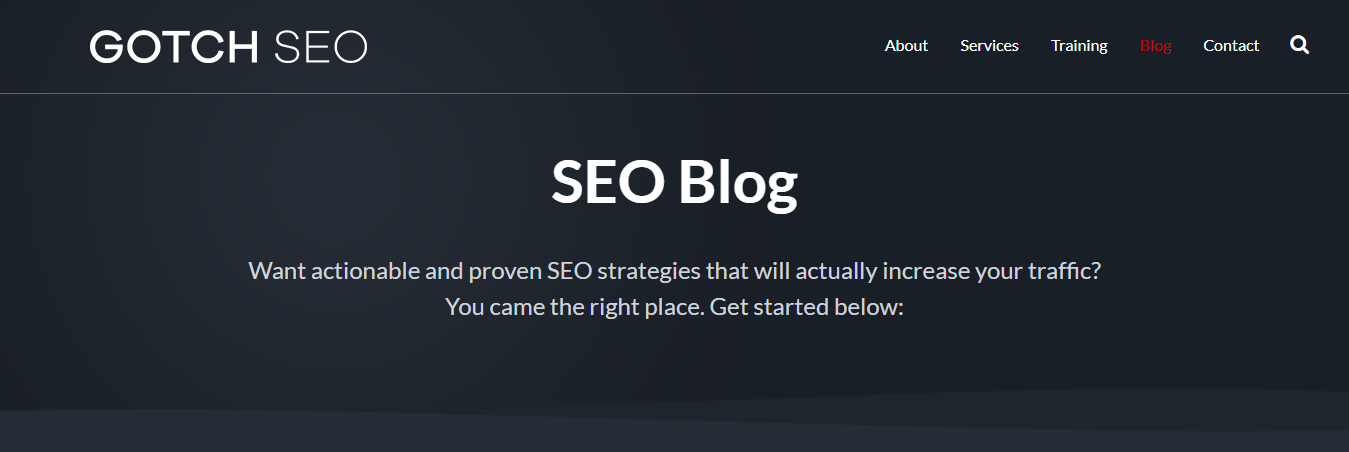Start Exploring Keyword Ideas
Use Serpstat to find the best keywords for your website
How To Create A Successful Digital Marketing Blog: Asking Experts


We interviewed top blog editors to identify how to create a digital marketing blog that'll catch attention. Check this post to learn new tips for your blog :)
Search Engine Journal


Search Engine Journal launched in 2003, which makes it the second longest running publication dedicated to all things SEO and search marketing. We currently have ~600,000-650,000 visitors per month and 1.1-1.2 million pageviews per month. Plus, we have roughly 350,000 social media followers.
How is the workflow organized: how many people are on your team? How are the responsibilities assigned?
Our editorial team has 13 members, including two writers dedicated to covering breaking news. We use Trello and Podio internally to organize our internal content production (articles, webinars, podcasts, etc.).
What KPIs do you track and what metrics do you use to assess the blog effectiveness?
We track many metrics, including:
- pageviews
- organic traffic
- social shares
- social traffic
- social engagement (varies by network)
- new vs. returning visits
- email newsletter subscriptions
- content downloads
- revenue
How do you share your blog posts? What platforms do you use for distribution?
We mainly promote stories on Facebook, Twitter, and LinkedIn. Most recently, we've been experimenting on Reddit. Each platform has a unique publishing schedule, tailored to that network. For instance, we try to post high engagement content on Facebook and post in higher quantity on Twitter.
Who creates a content plan? And how?
I do most of the content planning, but I also get input from many members of our team and our contributors. Our news team is mostly autonomous, but I will suggest story ideas to them from time to time.
Do you involve guest authors? How?
Yes, we have more than 70 regular guest contributors (all of whom are authorities, influencers, and practitioners), plus dozens more ad hoc contributors. We have a private Facebook Group for SEJ contributors, where I throw out a batch of ideas once or twice a month (or as more time-sensitive ideas pop up). Many of our contributors also come up with their own topics/ideas for posts.
Share your most successful cases: what posts were the most popular, what marketing strategy was the most effective?
One thing that has really worked well for us is ebooks. I'll highlight one example from the last year, our SEO 101 ebook.
Win #1: This was sponsored, so we made money on it.
Win #2: It has been downloaded more than 10,000 times.
Win #3: The 18 chapters were repurposed into articles, all collected on our landing page.
Win #4: The chapters have attracted more than 100,000 views (and growing).
Win #5: The chapters got 25,000+ social shares.
Win #6: The chapters have earned more than 1,000 links.
Win #7: We now rank on many keywords any SEO-focused site should rank on.
What's also great about doing big content like this is that, once you nail your process, it becomes repeatable. So each time you do it, you learn and further optimize your process.
What challenges do you often face? What processes are exemplary?
Two big challenges are:
1. Content not being up to our standards. We want to publish only the highest-quality content possible. Everything must help, or be useful to, our audience. Unfortunately, not every post that gets submitted makes it to publishing. My hope is that rejection helps contributors learn and improve their writing – and, in most cases, it does. Also, it helps protect their personal brand – they shouldn't want anything out there that makes them look bad. In the end, we want them to look good, because it helps SEJ look good. And when SEJ looks good, they look even better for having their content published on it.
2. Duplication. While not a huge issue, it does come up from time to time. That is, a contributor will submit a post that largely covers the same ground as another post that someone else has signed up to write, or will be competing against another SEJ post that already ranks well on the same topic. Basically, that post, while it may be good, is doomed. The key is always differentiation. If you're a writer, ALWAYS make sure that your post has a different angle if the topic has been covered before on the site you're writing for. If you're the editor, then don't be afraid to tell the author that, while it's great, you already have published a similar post. Again, it's a learning experience for the contributor.
As for exemplary process, I'd say our editorial review process works excellently. SEJ is lucky to have a fantastic editorial assistant who help manage the deadline reminders, flags any potential issues (either to the author or to me), and copy edits the posts before I do a final content review. Having our process in place ensures we always have a steady stream of incoming content.
What advice do you have for beginners in the content-marketing?
Gotchseo


I started the Gotch SEO blog back in 2014 but started taking it more seriously in 2016. As of 2018, Gotch SEO gets around 50,000 visitors per month.
How is the workflow organized: how many people are on your team? How are the responsibilities assigned?
I have a video editor, graphic designer, and web design/development team that helps me with all content creation for Gotch SEO and our client campaigns. I'm the architect for most content creation, so the assignments usually come from me.
What KPIs do you track and what metrics do you use to assess the blog effectiveness?
My primary KPIs are revenue, profit, and total organic search traffic (in that order). The end goal of my blog content is to drive revenue for my company. Sometimes that's in the form of getting new qualified leads and other times it's converting that traffic into email subscribers (which pushes them into a sales funnel).
How do you share your blog posts? What platforms do you use for distribution?
I share my content across my own assets such as my email list and social media channels. But then outside of my owned assets, my team and I are focused on acquiring backlinks to new assets.
Who and how creates a content plan?
My team or I build a database of keyword targets and then we focus on trying to create assets around those targets. My focus is on maximum quality and I pay little attention to quantity or routinely publishing.
Do you involve guest authors? How?
Very rarely, but when I do, they need to have a proven track record of getting results.
Share your most successful cases: what posts were the most popular, what marketing strategy was the most effective?
One of my most popular posts is my backlinks guide. This is an interesting guide because it actually leverages what I call The Cake Technique.
In essence, The Cake Technique the process of consolidating similar content assets into one mother asset. This is a powerful method I've replicated across countless campaigns it works like a charm. That's because:
- you're making the asset longer (word count)
- you'll be hitting more long-tail keywords
- you'll be sending all the link equity from consolidated assets to the new mother article and
- it's easier to promote (and upgrade) a single asset than it is many.
What challenges do you often face? What processes are exemplary?
Trying to balance creating epic content and developing sales processes is always a challenge. What's worked best for me to develop highly-targeted funnels. An example is my basic funnel that starts with my SEO content guide. Here's how it looks:
1. SEO Content Guide
2. Lead Magnet - 21 Examples of Perfect SEO Content
3. One-Time Offer (join Content Academy at a discounted price)
- If "Yes", then Upsell: Gotch SEO Academy
- If "No", they enter a short automated sequence with another limited discounted offer.
~ 42% of people who invest in Content Academy also invest in Gotch SEO Academy.
I try to keep my funnels hyper-relevant because it seems to covert the best.
What advice do you have for beginners in the content-marketing?
Ignore my previous answer because you don't need to be that advanced in the beginning. My #1 piece of advice is to be willing to invest time and money into your content. One incredible content asset is superior to 50 average pieces of content.
Optimonk


The OptiMonk blog focuses on eCommerce marketing, conversion rate optimization and lead generation. Our blog started in 2014, May — the same time our product was released. In the first few months, we had 2,000 - 4,000 monthly visitors. Today, we are proud to say that we have 25,000+ visitors per month.
How is the workflow organized: how many people are on your team? How are the responsibilities assigned?
There are 5 people involved in our content team: a CMO, a Content Marketing Manager, an SEO specialist, a proofreader & a junior marketer who is ready to help with all kinds of tasks.
What KPIs do you track and what metrics do you use to assess the blog effectiveness?
KPIs are very important to us. We always try to find the right metrics to measure. Some examples we track right now: overall blog visits, social shares per post, new leads coming from each blog posts, top posts.
How do you share your blog posts? What platforms do you use for distribution?
Content promotion is an important part of our content creation process. We use email marketing, social media pages, LinkedIn & Facebook groups, Quora. And we also like to recreate blog posts in other formats, e.g. slide decks, and upload them to SlideShare. It helps to reach more people.
Who and how creates a content plan?
We hold a content planning meeting at the end of each quarter to plan the next 3 months. Our whole marketing team takes part in the meetings and usually, our customer success team joins as well.
Do you involve guest authors? How?
We actively do not look for guest authors at the moment, but many sites reach out to us to exchange guest articles and we are usually open for it.
Share your most successful cases: what posts were the most popular, what marketing strategy was the most effective?
One of our most popular posts was an e-commerce email marketing guide which includes a swipe file visitors could download. Using this strategy we were able to generate many leads.
What challenges do you often face? What processes are exemplary?
One of our biggest challenges recently was deciding about the topics of the blog. We didn't want to focus too broadly, so we had to come up subcategories that relevant for our business.
What advice do you have for beginners in the content-marketing?
Our advice is to always make sure the content you produce is relevant to your audience and it is the best information available on the Internet. If your content is not good enough, you can promote it as much as you want, you won't achieve the waited results.
Page One Power


Our blog first appeared as the Page One Power blog in 2012, and it mostly covered industry and company news. Since then, the blog has evolved into "Linkarati," a leading source of link building and SEO information for the digital marketing community. Our pivot to an information-driven, community-focused platform has helped the blog grow tremendously to ~15,000+ visits per month.
How is the workflow organized: how many people are on your team? How are the responsibilities assigned?
Our team has grown and shifted over the years, and currently we have a two-person team featuring a Managing Editor and Staff Writer. Our team members share content creation and long-term strategy responsibilities.
What KPIs do you track and what metrics do you use to assess the blog effectiveness?
Our primary KPI is blog subscribers, but we track a number of other metrics, including:
- keyword rankings
- organic traffic
- time on page
- bounce rate
- linking root domains
- social shares
- authority growth (in terms of DA/PA/CF/TF/UR)
- qualified leads that mention reading a blog post
How do you share your blog posts? What platforms do you use for distribution?
We primarily promote our blog posts via Twitter and LinkedIn, and we provide a secondary boost to our content via our newsletter.
Who and how creates a content plan?
Content plans can be created by the Managing Editor, Staff Writer, or another person from within the company who is interested in contributing. The Managing Editor oversees the implementation of any new content plan.
Do you involve guest authors? How?
Yes, we accept guest posts that meet a high editorial standard. Most of our guest authors come from respected SEO agencies or tool providers. Guest authors must first pitch a few detailed outlines that clearly explain what their proposed topics would be about, and if an outline is approved a draft can be submitted.
Share your most successful cases: what posts were the most popular, what marketing strategy was the most effective?
Some of our most popular posts have been detailed, in-depth coverage and analysis of the major conference trade shows we attend. These posts highlight all the valuable insights shared at the shows and offer an alternative way to digest the information presented for those who did and did not attend the event.
What challenges do you often face? What processes are exemplary?
One of the challenges I face having a small team is maintaining ongoing promotion for our content beyond the initial push following publication. Tools like Buffer and HootSuite can help with scheduling Tweets and shares out into the future. Performing regular content and site audits can also unearth opportunities to re-promote older posts or perhaps even repurpose them to a new format for extended value.
What advice do you have for beginners in the content-marketing?
My main advice for a beginner or someone new to content marketing would be to start by immersing yourself in your industry. Follow all of the most influential people in the industry, read all available industry-leading resources, and regularly check the websites that publish news regarding your niche. Before you can effectively market your business, brand, and yourself you need to have a deep understanding of your industry and people/websites that are already providing best-in-class content.
Klientboost


We started our blog a few years ago, back in April of 2013. But back then it was just our CEO, Johnathan Dane, sharing his personal PPC expertise. The blog didn't start operating with consistency until April of 2015. But since then, we've steadily published a minimum of one blog post per week. We generate roughly 35,000 users a month, and our blog content is responsible for about 27.74% of that. In August of 2018, we saw 9,523 new blog readers alone. What speaks even greater lengths about the success of the KlientBoost blog is our returning readers, though. In terms of total page views, we generated 80,952 in August. Of that total, 45,809 of those pages were users reading blog posts. That's a whopping 56.68% of our page views dedicated to blog content. And it's double the percentage of our first time visits meaning that we have a very loyal readership.
How is the workflow organized: how many people are on your team? How are the responsibilities assigned?
Our blog is usually managed by a team of at least two: The Content Manager and the Content Marketer (or Content Writer). Both of these positions must be very versed in technical SEO writing and content marketing.
For the most part the responsibilities can be divided as they are below:
Content Manager:
- Research new keyword opportunities
- Manage website for technical SEO issues
- Optimize blog for keyword ranking & technical SEO
- Assign writing tasks and manage writers
- Manage email campaigns for guest blogging opportunities
- Manage social promotion campaigns for blog posts
- Manage Mailchimp email promotion for blog posts
- Network with other Content Managers for link building
- Assist in high-value "whale" guest blogging
- Assist in highly technical or "advanced" KB blogs, etc.
Content Marketer (Writer):
- Write 1 KlientBoost blog post per week
- Write 2 guest posts (won by Content Manager) per week
- Manage personal email outreach for own guest posting
- Manage KlientBoost social accounts for continued promotion
- Research past KB blogs for necessary updates, etc.
What KPIs do you track and what metrics do you use to assess the blog effectiveness?
We started to offer Blog Subscriptions on our site, with weekly emails to keep users updated. Because of this, our blog subscription goal within Google Analytics became one of our blog content's valuable KPIs. Instead of focusing on Blog Subscriptions, we now measure the success of our blog by actual #getProposal conversions. We do still measure Blog Subscriptions. However they simply aren't valued as highly as their actual #getProposal counterparts.
How do you share your blog posts? What platforms do you use for distribution?
In terms of sharing our blog posts, we employ something called the Egyptian Method. This is a comprehensive form of content promotion that relies on several different channels to promote every single piece of KlientBoost content we publish over an entire month after its publication date.
The Content Manager is entirely responsible for creating the Content Calendar. This includes researching new keyword opportunities for blog posts as well as other forms of gated content, video content, guest posting, and more. The KlientBoost team prides itself on its in-depth mastery of all things PPC & CRO. For that reason, we also like to incorporate our Account Managers and Conversion Designers on our blog when they have valid first-hand experiences to share with our readers. These blog posts are given to the Content Manager to fit into the content calendar and make sure they align with the tone and message of the KB blog.
Do you involve guest authors? How?
The KB blog is fairly strict with guest writers. But yes, we do accept guest content if we feel it meets our very high standards of what valuable PPC blog content should be. Having said that, we heavily rely on guest posting ourselves to generate high quality backlinks and traffic to our domain. Of our 34,327 users in August, just over 3,900 of them were from guest content alone. That's 11.37% of our traffic coming from referring blog content — people who are reading what we write on other blogs and still want to come to our site to convert.
Share your most successful cases: what posts were the most popular, what marketing strategy was the most effective?
The KlientBoost blog has seen a great deal of its success come from a few very strong blog posts. This is because we're considered the "masterminds" behind certain branded techniques in the PPC industry. If you've ever read about The Iceberg Effect, Single Keyword Ad Groups (or eCommerce SPAGs), or The BreadCrumb Technique, you know what I mean. These posts generate a large bulk of our inbound traffic. Mainly for two reasons.
First, these posts do a great job of maintaining their ranking at the top of the first page of Google. Second, because readers recognize us as the masterminds behind these branded strategies, we get very high CTRs as well. Beyond these posts we like to continually expand our keyword base for both traffic purposes and link building purposes to our key service pages (where the bulk of our conversions occur). However, recently we've been experimenting with low search volume, direct value blog topics with great success.
Below are a few blog posts that we've recently published that fall under this test category:
- 22 PPC Management Mistakes That Will Make You Switch Agencies
- The Pros And Cons Of Different PPC Agency Pricing Models
- The Digital Marketer's Guide To The Google Ads 2018 Rebrand
These posts have done incredibly well not only when it comes to traffic, but with conversions — which is what we really care about. Our belief is that these blog posts are targeting a certain business-centric mindset in our readers that makes them more eager to do business with us. And, even though we pride ourselves on being thought leaders in the industry, what we want in the end is more clients. So seeing blog posts like this perform as they are is more than gratifying.
What challenges do you often face? What processes are exemplary?
The biggest challenges we've faced over the past year have been related to dealing with bandwidth. Not always having a two-person content team can make managing the high level of output we rely on difficult. However there are plenty of marketing and writing tools out there that allow busy digital professionals to stay on top of things.
More than any other tool or trick, however, I've found that using the Hemingwayapp is my personal secret weapon. This is a great (and FREE) tool that helps keep your writing succinct, easy to read, and blog friendly. It's super helpful for making sure your highly technical subject is still blog-reader friendly. Not only that, it will keep you on pace with your writing if you have a busy schedule so you don't end up dedicating too much time to one, massively unreadable post. As a whole, the app makes all blog content and SEO writing easier on digital marketers, and I personally believe every Content Writer, Marketer, Manager, and Director should use it.
What advice do you have for beginners in the content-marketing?
Don't live by the keywords and the metrics. When it comes to search marketing, we've all been taught so heavy-handedly that split testing and numbers are the best way to decide if an opportunity is worth chasing or a blog post is worth writing. But the truth is that — more often than not — you're writing to reach and engage with an actual reader on the other end of the search engine. So, for any content marketer looking for real success, try focusing on what the reader might value the most in a blog post instead of worrying only about what keyword will give you the highest search volume. That's my biggest advice to any content marketer. That, and use the HemingwayApp for writing awesome, concise blogs.
Blogging Wizard


Blogging Wizard is a website that I started in December 2012. At the time, I was working at a local marketing agency and I wanted a platform to share what I was learning.
Our focus is on helping other bloggers cut through the noise and get a handle on digital marketing. We broke the 100 visitors per day point quickly and within a few months we were on around 500 visitors per day. Now, we get around 170,000 visitors each month.
How is the workflow organized: how many people are on your team? How are the responsibilities assigned?
Blogging Wizard is and probably always will be more of a personal project than anything. Content marketing is at the heart of what we do, so everything is focused around that. But growth is at a point where I've been able to bring on extra people. I have an editor, social media manager and small team of writers.
I handle growth, strategy and content planning. That includes vetting any content before it goes to my editor. For both our writers and any external writers (guest posts).
My editor handles proof-reading and loading posts into WordPress. As well as repurposing content into other formats such as Slideshare presentations, etc.
Our social media manager, while taking care of the obvious, also handles part of our content promotion.
We have developed an editorial process over the years that we constantly tweak. Part of this includes a step-by-step content promotion process. Each part is assigned to the person who is best suited to each part.
We have a fair amount of design work that goes into our content. We outsource most of this to a company called Design Pickle — they handle pretty much everything apart from infographic design work. In the early days I did all of the imagery myself. It was great because I was saving money but the quality of the designs was poor and they'd take ages to do. Outsourcing the design work is one of the best decisions I've made.
What KPIs do you track and what metrics do you use to assess the blog effectiveness?
There are so many metrics we could track but most of them are a distraction. I mostly focus on revenue and audience growth metrics (traffic/email subscribers). But I like to keep my eye on keyword rankings as well since they generate a lot of traffic. Ultimately, I follow this ethos when it comes to metrics - find what works and do more of it.
How do you share your blog posts? What platforms do you use for distribution?
I alluded to this earlier, but we have a substantial promotional process that we work through after each piece of content is published.
This includes promotion across major social networks, social bookmarking sites, content aggregators and more. We have a content repurposing strategy too which includes re-configuring content for platforms like Slideshare. There a lot of platforms that don't generate much in terms of meaningful results, so we try to focus our time on what has the most potential for actual results (think: 80/20 rule).
But there are a few platforms in particular that generate decent results:
- Zest.is — A stream of marketing content delivered via the New Tab in Chrome. You can suggest content but it is vetted first to ensure quality is high. Side note: this is the main way I find new marketing related content to read.
- Quuu Promote — A paid platform that allows you to get your content shared by users of the Quuu platform.
- Triberr — Here you'll find a collection of tribes of bloggers. You can create tribes to share your content with or you can apply to other tribes. Results aren't as good as they were, but it's still worth while.
- Tailwind Tribes — Tailwind is the most complete Pinterest marketing platform I've found. If you're publishing high quality imagery to promote your content on Pinterest, it's well worth joining some tribes and sharing it there.
- Flipboard — A social app for curating and consuming content, Flipboard has the potential to drive traffic if enough people share your content. You'll get the most mileage if you create a magazine and grow an audience around it. By all means, share your content but share plenty of third party content too.
Who creates a content plan? And how?
We have a database of topic ideas to cover. We expand these whenever we have a good idea and develop each idea if we can, at the time. This means we've got plenty of ideas to draw from at any given time. For individual content pieces, it depends. The typical OP is for the writer to put together an outline. I'll review and provide suggestions if required.
Do you involve guest authors? How?
We do, but sparingly. I'm very protective over my audience. And I vet each guest author individually to ensure they can deliver useful and well-written content.
Growing an audience involves earning trust. Each piece we publish has the potential to solidify that trust, or break it. We try not to publish too many guest posts because they're typically framed around someone else's agenda.
There are a few issues we've had with accepting guest posts:
- Some authors will deliver content that is substantially lower quality than the sample articles they send.
- I used to provide a lot of feedback for articles that needed edits so we could publish them - a lot of authors end up not making the changes (or replying to the email in some cases).
Share your most successful cases: what posts were the most popular, what marketing strategy was the most effective?
Aside from publishing controversial articles, most marketing related content has limited virality and it's extremely competitive. One of my favourites was a group interview we published a while back on how to stand out online.
The initial post performed well. We had over 5,000 visitors in a few days and had over 2,000 social shares. But, it's what happened after that I wasn't expecting.
I wanted to see if we could get some more mileage out of the piece, so I partnered with TweakYourBiz.com and 24Slides.com. 24Slides turned the article into an eye-catching infographic and we published it on TweakYourBiz.
The extra time and effort in repurposing this piece was minimal. And simply by letting all of the contributors know about it, and doing some additional promotion we got another 2,000+ social shares and over 32,000 visits to the infographic.
Here's what to take away from this: the lesson here isn't that you should publish expert roundup style posts (they don't perform as well these days and there are better approaches to take). What worked well here is harnessing the power of niche influencers and repurposing your content to squeeze as much out of it as you can.
What challenges do you often face? What processes are exemplary?
The biggest challenge is always time. It takes an incredible amount of time to craft and promote in-depth content. But as growth continues and the team grows, that definitely gets easier.
Other than that, I've come up against plenty of challenges in previous businesses.
My first business (a digital record label) was a financial failure and my second website died pretty quick.
Fast forward a few years and I was managing a team of marketers and was responsible for the content marketing efforts of global brands. The learning curve was extreme but it taught me a lot. I've worked hard to use all of those experiences to my advantage. Both from what worked, and what didn't work.
I'm of a cautious nature — the complete opposite of the "move fast and break things" approach. And it's served me well. It hasn't stopped me from making mistakes and hitting roadblocks, of course, but more than anything it's helped me to avoid making risks I can't recover from. I like to be as flexible as possible so I can adapt to future challenges. That said, challenges are often a good thing (once you work through them, of course).
What advice do you have for beginners in the content-marketing?
The content you create needs to be great but that's only part of the puzzle. The "build it and they will come" strategy rarely works — hitting publish is just the beginning. Starting from scratch is hard work. It takes time to build an audience but you can side-step that somewhat by harnessing the influence of those who already have an audience. Don't let it stop there! Invest as much time as possible in promoting your content. Build a network of contacts in your niche and consider content distribution during the ideation phase (you'll get better results if you do).
Treat social media as a platform to increase engagement and promote your content. But remember that building an email list is a better way at reaching your audience directly in most cases. And with a focus on strategic content, you can grow your email list much faster.
But above all else — be patient and experiment with different promotional tactics. If you find something doesn't give you the results you're looking for — don't immediately discount it. There's usually a reason why and in some cases you may need to give it more time, or change your approach. Ultimately, find what works and do more of it.
Robbie Richards

I started my blog in 2014, and today it gets around 30,000 visitors per month.
How is the workflow organized: how many people are on your team? How are the responsibilities assigned?
I manage the keyword research, content briefs, edits and monetization strategies. Then, I have one contracted writer, two VAs to help with link prospecting and graphics, and a part-time technical/ dev resource for ad hoc projects.
I'm about to hire some resources to help with video editing and content upload/formatting on the site.
What KPIs do you track and what metrics do you use to assess the blog effectiveness?
- Profit
- Revenue
- Course waitlist growth
- Email subscriber count
- Organic traffic
I monetize traffic in 3 ways: agency clients, affiliate income, and course revenue. I only track the KPIs that directly support those revenue streams.
How do you share your blog posts? What platforms do you use for distribution?
My main distribution channels are (1) email list (re-send to non-openers after a week), (2) social media channels, (3) facebook ad to email subscribers (will start doing more with this in the future), (4) sharing with my private course community (The SEO Playbook), (5) seed engagement inside industry communities such as Growth Hackers, and (6) run outreach campaigns to acquire links.
Who and how creates a content plan?
I create the content plan. My process is pretty simple - build a list of keywords by reverse engineering competitors, and write content that blows them out of the water. Every piece of content needs to have a keyword focus, and serve one of three objectives:
1) attract agency leads
2) generate affiliate income
3) generate email signups.
I'll select the keyword target and create a detailed brief for the writer. The brief will be added to our internal Content Pipeline document and the writer will start work. The content will go through one round of edits from the writer, then I will do some heavy editing to ensure it fits the tone and quality readers have come to expect on the blog.
Do you involve guest authors? How?
Rarely. But when I do, it's usually a person I hand-picked after reading on of their articles.
Share your most successful cases: what posts were the most popular, what marketing strategy was the most effective?
Expert roundups have been the most popular post type. I've published several, like this one, that not only generated loads of social engagement, but also ranked for competitive mid-funnel search terms that drive a lot of higher-intent traffic.
There are a few reasons why, if done right, these posts can be very successful:
Engagement: influencers are much more likely to share content they have been featured in.
Length: featuring 20+ expert responses can give you a lot of content.
Crowdsource credibility: get experts to vote on tools/software can help generate third-party credibility, as opposed to me just sharing the tools I like and use.
Linkable: these assets typically acquire links from the featured influencers, or people inside their circles
What challenges do you often face? What processes are exemplary?
My biggest challenge at the moment is scaling the content creation process, while preserving the high quality readers have come to expect. I spend a LOT of time on content briefs and editing.
What advice do you have for beginners in the content marketing?
A few key points of advice:
Discover More SEO Tools
Text Analysis Tool
Unlock the power of your text data with our advanced Text Analytics Tools
AI Content Detection
Ai Content Checker – realize if the text is AI-generated
AI Text Generator
Try our AI Content Writer tool and streamline your content creation process
AI Content Tools
AI Content Marketing Tools – simplify and optimize the content creation process
Recommended posts
Cases, life hacks, researches, and useful articles
Don’t you have time to follow the news? No worries! Our editor will choose articles that will definitely help you with your work. Join our cozy community :)
By clicking the button, you agree to our privacy policy.